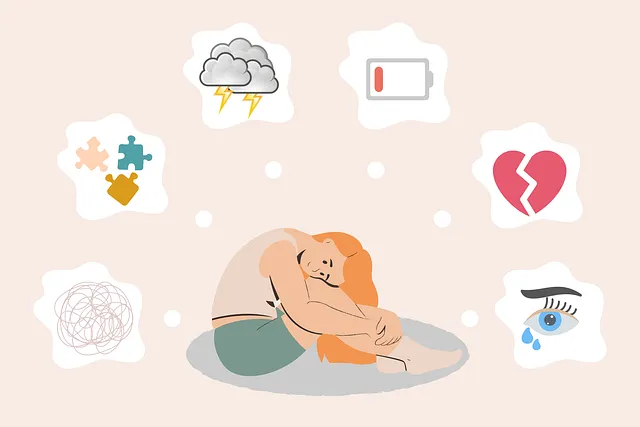Mental illness stigma significantly hinders access to care at Longmont Kaiser Permanente Psychiatry, leading to negative impacts on patient well-being. To combat this, the facility promotes self-care, emotional intelligence, and robust risk management planning. A multi-faceted approach including education, outreach, policy changes, and media representation is crucial for stigma reduction. Longmont Kaiser Permanente's initiatives like workshops, support groups, crisis intervention, and advocacy empower individuals to manage their mental health effectively and foster a more inclusive society.
“Stigma surrounding mental illness persists, impacting individuals’ well-being and access to care. At Longmont Kaiser Permanente Psychiatry, we’re at the forefront of stigma reduction efforts, employing comprehensive strategies to change perceptions. This article explores our challenges and successes in combating mental health stigma through patient education, support groups, community engagement, policy advocacy, and media representation. By fostering open dialogue, we aim to create a more inclusive environment for all patients at Longmont Kaiser Permanente psychiatry.”
- Understanding Mental Illness Stigma: Challenges and Impact at Longmont Kaiser Permanente Psychiatry
- Strategies for Reducing Stigma: A Comprehensive Approach
- Patient Education and Support Groups: Empowering Individuals at Longmont Kaiser Permanente
- Community Engagement: Fostering Open Dialogue and Awareness
- Policy and Media Representation: Shaping a More Inclusive Narrative
Understanding Mental Illness Stigma: Challenges and Impact at Longmont Kaiser Permanente Psychiatry

Mental illness stigma is a significant barrier to accessing care at Longmont Kaiser Permanente Psychiatry. The impact of this stigma is profound, leading to feelings of isolation, shame, and fear among individuals struggling with mental health issues. This can result in delays in seeking treatment, reduced treatment adherence, and ultimately, worse outcomes. Understanding the root causes of stigma is crucial for effective reduction efforts.
Challenges associated with mental illness stigma at Longmont Kaiser Permanente Psychiatry include misperceptions, lack of education, and limited exposure to diverse experiences. To address these issues, the facility encourages self-care practices and emotional intelligence among both patients and mental health professionals. Moreover, implementing comprehensive risk management planning can help mitigate potential risks related to stigma, ensuring a safer and more supportive environment for all individuals seeking psychiatric care.
Strategies for Reducing Stigma: A Comprehensive Approach

Stigma reduction efforts for mental illness require a comprehensive approach that involves education, outreach, and policy changes. One effective strategy is to promote Mental Health Awareness through community events, workshops, and educational programs. These initiatives can help dispel myths and misconceptions about mental health conditions, fostering a more understanding and empathetic society. Longmont Kaiser Permanente psychiatry services play a pivotal role in this by providing accessible resources and support for individuals seeking Anxiety Relief and stress reduction methods.
Additionally, involving those affected by mental illness in advocacy and storytelling can significantly impact stigma reduction. Sharing personal experiences openly but respectfully can humanize mental health struggles, encouraging others to view these conditions with compassion rather than judgment. Such efforts should be accompanied by robust media representation that portrays accurate and nuanced narratives about mental health challenges, which can further contribute to Stress Reduction Methods and a more inclusive society.
Patient Education and Support Groups: Empowering Individuals at Longmont Kaiser Permanente

At Longmont Kaiser Permanente, patient education and support groups play a pivotal role in stigma reduction efforts. These initiatives empower individuals facing mental health challenges by providing them with knowledge about their conditions and coping mechanisms. Through workshops, seminars, and peer-led discussions, patients learn effective strategies for stress management and self-care practices tailored to their unique needs.
The psychiatry department at Longmont Kaiser Permanente offers crisis intervention guidance to help individuals navigate difficult times. By fostering a supportive environment, these programs encourage open conversations about mental health, reducing the stigma associated with seeking help. Empowered with new insights and tools, participants gain confidence in managing their well-being, fostering a sense of community and resilience among peers.
Community Engagement: Fostering Open Dialogue and Awareness

In Longmont, Kaiser Permanente’s psychiatry services play a pivotal role in fostering community engagement aimed at reducing mental illness stigma. Through various initiatives, they encourage open dialogue and awareness programs that help dispel misconceptions surrounding mental health challenges. These efforts include educational workshops, support groups, and public talks designed to create a safe space for individuals to share their experiences, thereby promoting understanding and empathy within the community.
By actively involving community members in these discussions, Kaiser Permanente psychiatry seeks to enhance self-esteem improvement and confidence boosting techniques. They recognize that promoting emotional well-being involves more than just clinical care; it requires societal shifts towards accepting mental health as a fundamental aspect of overall wellness. This community engagement strategy not only reduces stigma but also equips individuals with the tools needed to navigate their emotional journeys more effectively.
Policy and Media Representation: Shaping a More Inclusive Narrative

Policy and media representation play a pivotal role in shaping public perception and reducing stigma surrounding mental illness. At Longmont Kaiser Permanente psychiatry, for instance, there’s an ongoing effort to promote inclusive narratives that challenge stereotypes often associated with mental health conditions. By advocating for evidence-based practices and sharing real-life stories of recovery, they’re helping to normalize conversations around mental wellness.
Media outlets have a significant influence on societal attitudes, making it crucial to ensure accurate and empathetic portrayals. Encouraging diverse representation in media can foster a deeper understanding of mental illness as human experiences rather than mere stereotypes. This shift in narrative can inspire hope, encourage seeking professional help, and ultimately contribute to building resilience and anxiety relief for individuals facing mental health challenges, supported by effective exercises like mental wellness journaling and guidance from healthcare professionals.
Mental illness stigma reduction requires a multi-faceted approach, as demonstrated by initiatives at Longmont Kaiser Permanente psychiatry. By combining patient education and support groups, community engagement through open dialogue, and strategic policy and media representation, these efforts aim to create an inclusive environment where individuals with mental health conditions feel empowered and supported. Such comprehensive strategies are vital steps towards erasing the stigma that has long surrounded mental illness, ensuring folks receive the care they need without fear of judgment or ostracization.






